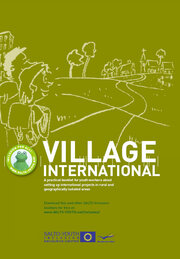Involving and changing the local community
The young people you are working with are not 'living on an island'. Especially in rural areas, there are strong ties to the family and to the local community. Everybody knows everybody and there is lots of social control. This could be a strength, because people are very inclined to support you. But on the other hand, traditionalist thinking might also block youth projects, that aim for change. Families might be reluctant to let their children go abroad on an international project in a strange country. They might not come back to the village again. How can you deal with concerned parents and suspicious villagers?
Gain respect for the youth work you do
- It is perfectly normal for parents to not want to let their children go to some strange unknown place or group abroad. Therefore it is important for you, as a youth worker, to show why you are doing the activities you are doing. Make them aware of how enriching this experience can be for their children and for the local community. The benefits of rural projects can help you with this.
- You can also tell the parents or people in the local community about 'positive examples': e.g. other young people (who you know or they know) who have profited from a stay abroad and got a better job, improved their language skills, become more active in the community afterwards, etc. House visits or chatting in the street, in the local shop or at the pub could help.
- Build trust with the local community and the parents. Show that you know what you are doing with their children, and that you have the necessary competencies to do your job (maybe you have a youth work qualification, or a first aid certificate,...).
- You can show that you will manage the project professionally through regular communication about it and other activities. Or you can also try to involve the community in the implementation of the project (e.g. helping out with a fund-raising evening). This way, they can experience at first hand the way you work and the enthusiasm of the young people.
- Sometimes parents are more inclined to trust people or documents with more 'status'. Get the oldest and most serious looking youth worker (in a suit and tie?) to talk to the parents, or show the 12 stars of your Youth in Action grant contract, or send them the article in the newspaper about your project,...
- Gaining respect is also about not losing respect. Avoid situations that might show your youth organisation or project in a negative light (e.g. getting a bit too drunk at a party, mis-managing the money, complaints about the kids, not responding to problems,...)
More about the visibility of your project and the dissemination of your project results in Making Waves - a booklet about creating a greater impact with your youth project - www.SALTO-YOUTH.net/MakingWaves/.
^^ top ^^
Working on stereotypes and changing mentalities
- Small communities tend to stick to tradition. Things are done in a certain way in the village, and most of the people prefer that it stays that way. Combine this with relatively extensive social control and you find yourself quite limited in the things people will accept from you. Therefore you need to find the middle way between respecting traditional values, but still doing a project that aims to change something small or that tries to do things differently (e.g. going abroad).
- Communicating about your project and why you are doing things the way you do them is very important. Put your activities in a broader picture: show that other (respected) people think or do the same. E.g. the prime minister also did youth projects when he was young, the youth exchange is part of someone's social studies, etc.
- Involve important figures from the local community e.g. the mayor, the priest or school teachers. Show off the way in which these people approve of what you are doing e.g. at meetings or in the media. If they support you and your cause, other people from the community will also tend to do so.
- The people in your village will give you more credit and leeway if there is also something in it for them. Involve them in the project to give them a taste of the international dimension. Do something useful for the community which will benefit all the people (e.g. cleaning a beach or forest path during your project about ecology). This way they will come to respect you more and also approve of the work you are doing.
- Create visible final products from your (international) projects: e.g. a movie or a theatre-play, write diaries to publish in the local press or on internet blogs, create a website about your project. Present this to as many people as possible in the local community. Make use of the local media (newspaper, radio, TV).
- If people have stereotypes and prejudices about the partner countries you are working with, you could bring them into contact so that they can get to know what the people are really like. This can be via articles, but also at village parties, meetings or by hosting a group in people's homes.
- Prejudices only change through positive experiences. It is impossible to change people's minds by force. The opposite is more likely: mostly people counter-react if they are pushed in a certain direction. However, if they have free choice, their change of mind will be more sustainable.
- You could do this via a 'Living Library' in your community. Invite some international young people or organisations -as books - to an important occasion (festive day/traditional party) in your village. People from the village can use the 'living books' to talk to them and ask them questions about their lives and about certain topics that they have experience with. The unknown becomes known, and the stereotypes become less stereotypical.
More about working on stereotypes and prejudice in the All Different, All Equal education pack at www.alldifferent-allequal.info or www.SALTO-YOUTH.net/Toolbox/
More about 'Living Libraries' in the publication "Don't judge a book by its cover! The Living Library organiser's guide" (2005). This book can be ordered from http://book.coe.int/
Do you have any experiences or anecdotes about working with the local community - successfully - or when it went horribly wrong? Add them in the below (log in with your SALTO username or create one to leave comments) - thanx a million
^^ top ^^
 www.salto-youth.net/
www.salto-youth.net/
VillageInternational/

 Protected from exclusion
Protected from exclusion
Downloads
The following downloads are available:
- Village International - setting up international projects with rural youth - 2007
A step by step manual through the different stages of setting up a youth project in your rural or geographically isolated area. With lots of practical tips and tricks. Based on SALTO TC Rural 2007. (Rightclick & download to your PC)
